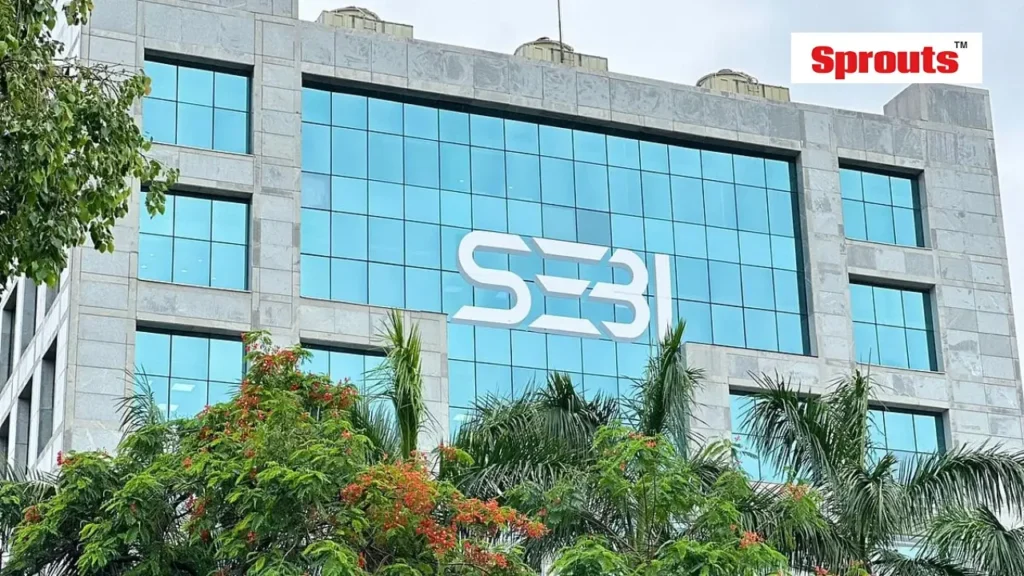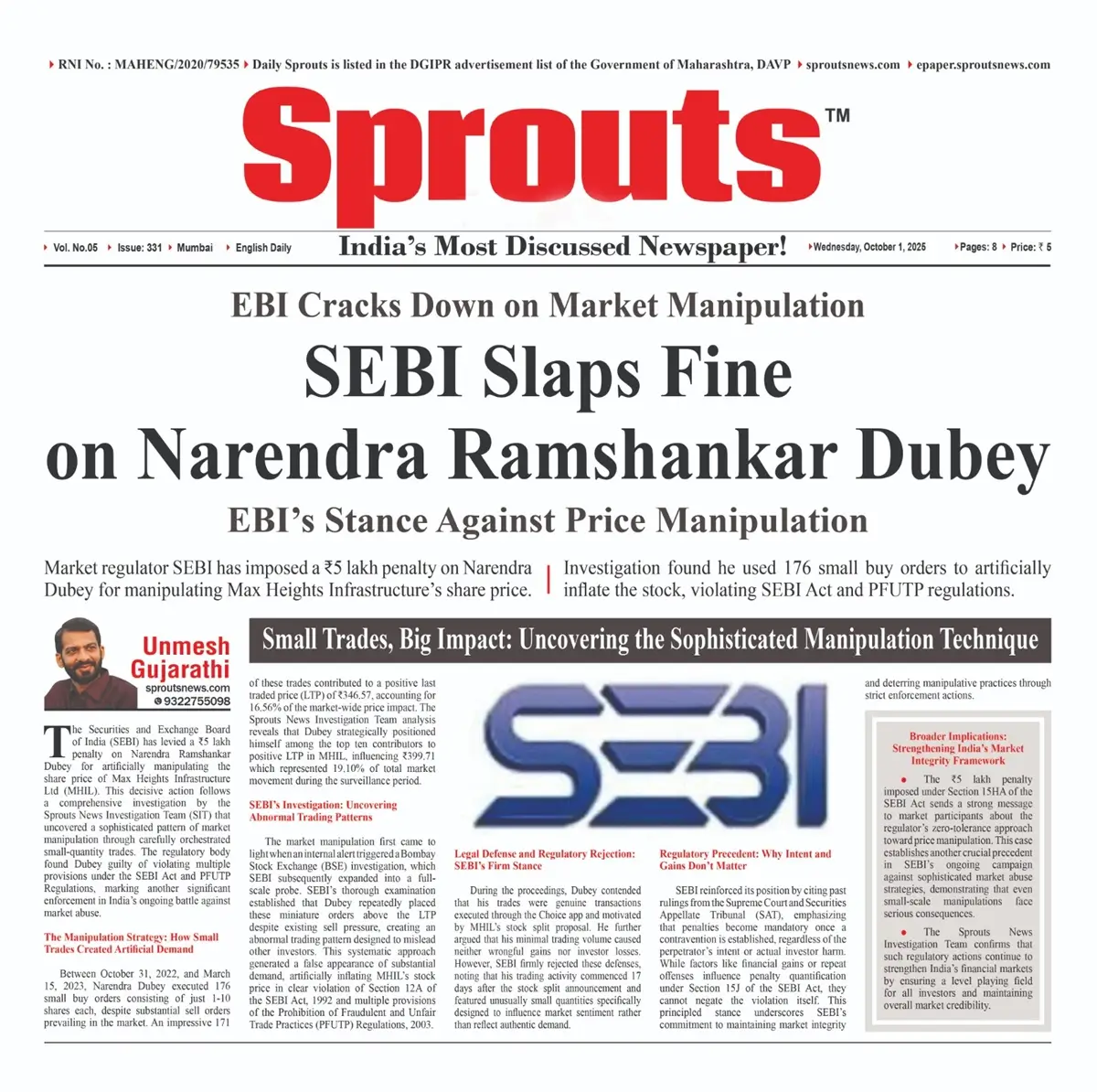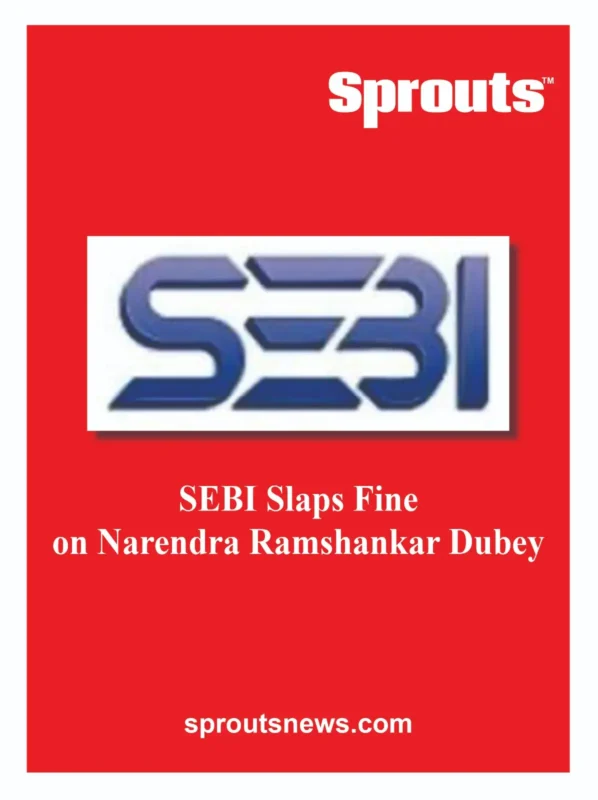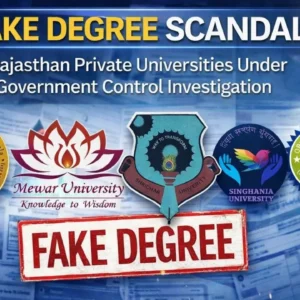SEBI Slaps ₹5 Lakh Fine on Narendra Ramshankar Dubey
• SEBI Cracks Down on Market Manipulation
• SEBI’s Stance Against Price Manipulation
• Small Trades, Big Impact: Uncovering the Sophisticated Manipulation Technique
SEBI has imposed a ₹5 lakh penalty on Narendra Ramshankar Dubey for manipulating Max Heights Infrastructure’s share price. The probe revealed 176 small trades used to artificially inflate stock value, violating SEBI Act and PFUTP rules. The action highlights SEBI’s crackdown on market abuse.
- SEBI Slaps ₹5 Lakh Fine on Narendra Ramshankar Dubey
- • SEBI Cracks Down on Market Manipulation
- • SEBI’s Stance Against Price Manipulation
- • Small Trades, Big Impact: Uncovering the Sophisticated Manipulation Technique
- The Manipulation Strategy: How Small Trades Created Artificial Demand
- SEBI’s Investigation: Uncovering Abnormal Trading Patterns
- Legal Defense and Regulatory Rejection: SEBI’s Firm Stance
- Regulatory Precedent: Why Intent and Gains Don’t Matter
- Broader Implications: Strengthening India’s Market Integrity Framework
The Securities and Exchange Board of India (SEBI) has levied a ₹5 lakh penalty on Narendra Ramshankar Dubey for artificially manipulating the share price of Max Heights Infrastructure Ltd (MHIL). This decisive action follows a comprehensive investigation by the Sprouts News Investigation Team (SIT) that uncovered a sophisticated pattern of market manipulation through carefully orchestrated small-quantity trades. The regulatory body found Dubey guilty of violating multiple provisions under the SEBI Act and PFUTP Regulations, marking another significant enforcement in India’s ongoing battle against market abuse.
Click Here To Download the News Attachment
The Manipulation Strategy: How Small Trades Created Artificial Demand
Between October 31, 2022, and March 15, 2023, Narendra Dubey executed 176 small buy orders consisting of just 1-10 shares each, despite substantial sell orders prevailing in the market. An impressive 171 of these trades contributed to a positive last traded price (LTP) of ₹346.57, accounting for 16.56% of the market-wide price impact. The Sprouts News Investigation Team analysis reveals that Dubey strategically positioned himself among the top ten contributors to positive LTP in MHIL, influencing ₹399.71 which represented 19.10% of total market movement during the surveillance period.
SEBI’s Investigation: Uncovering Abnormal Trading Patterns
The market manipulation first came to light when an internal alert triggered a Bombay Stock Exchange (BSE) investigation, which SEBI subsequently expanded into a full-scale probe. SEBI’s thorough examination established that Dubey repeatedly placed these miniature orders above the LTP despite existing sell pressure, creating an abnormal trading pattern designed to mislead other investors. This systematic approach generated a false appearance of substantial demand, artificially inflating MHIL’s stock price in clear violation of Section 12A of the SEBI Act, 1992 and multiple provisions of the Prohibition of Fraudulent and Unfair Trade Practices (PFUTP) Regulations, 2003.
Also Read: Mahabharat Actor Aayush Shah Accuses Singer Bishwajit Ghosh of ₹4.4 Cr Fraud.
Legal Defense and Regulatory Rejection: SEBI’s Firm Stance
During the proceedings, Dubey contended that his trades were genuine transactions executed through the Choice app and motivated by MHIL’s stock split proposal. He further argued that his minimal trading volume caused neither wrongful gains nor investor losses. However, SEBI firmly rejected these defenses, noting that his trading activity commenced 17 days after the stock split announcement and featured unusually small quantities specifically designed to influence market sentiment rather than reflect authentic demand.
Regulatory Precedent: Why Intent and Gains Don’t Matter
SEBI reinforced its position by citing past rulings from the Supreme Court and Securities Appellate Tribunal (SAT), emphasizing that penalties become mandatory once a contravention is established, regardless of the perpetrator’s intent or actual investor harm. While factors like financial gains or repeat offenses influence penalty quantification under Section 15J of the SEBI Act, they cannot negate the violation itself. This principled stance underscores SEBI’s commitment to maintaining market integrity and deterring manipulative practices through strict enforcement actions.
Broader Implications: Strengthening India’s Market Integrity Framework
The ₹5 lakh penalty imposed under Section 15HA of the SEBI Act sends a strong message to market participants about the regulator’s zero-tolerance approach toward price manipulation. This case establishes another crucial precedent in SEBI’s ongoing campaign against sophisticated market abuse strategies, demonstrating that even small-scale manipulations face serious consequences. The Sprouts News Investigation Team confirms that such regulatory actions continue to strengthen India’s financial markets by ensuring a level playing field for all investors and maintaining overall market credibility.



















